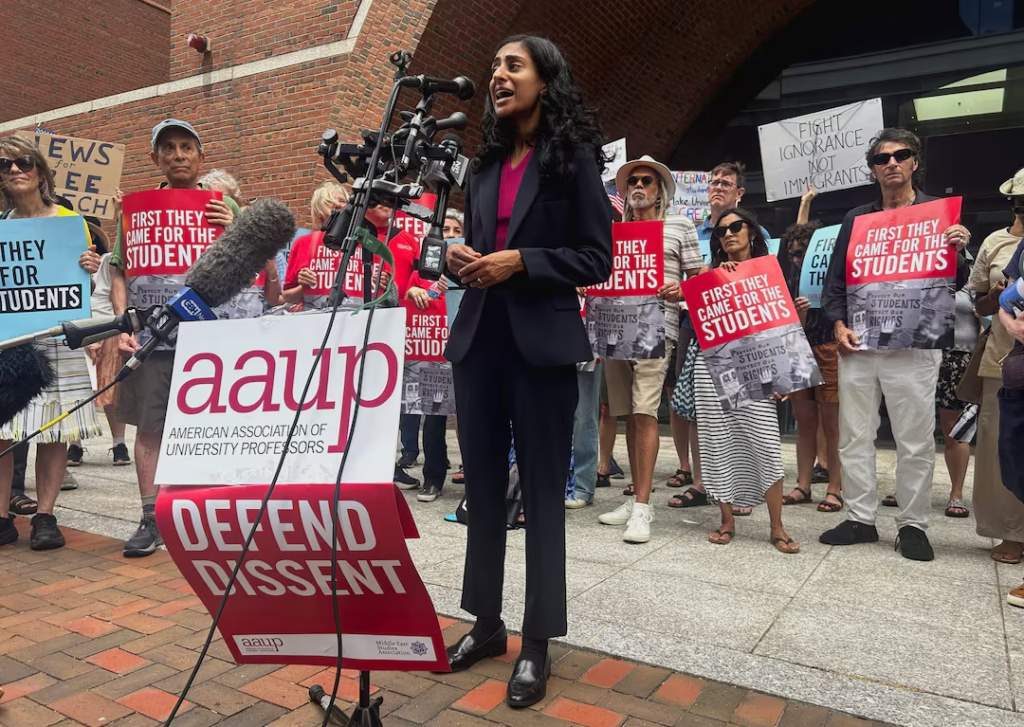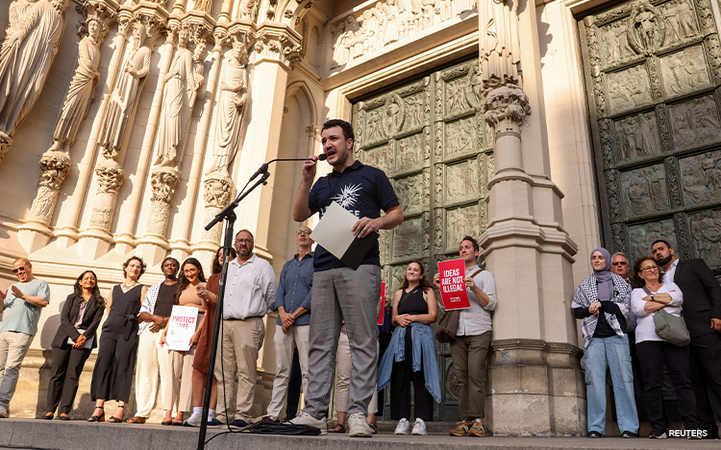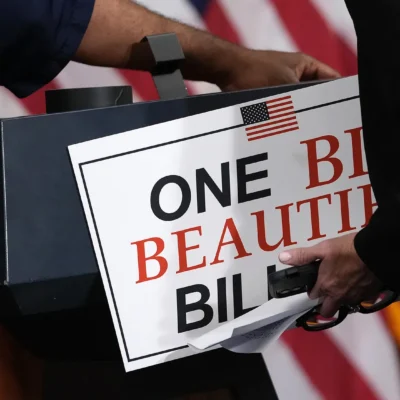Pro-Palestinian voices face legal battles in a politically charged trial
Trump-Backed Deportations at the Center of Legal Battle
The trial surrounding Trump-backed deportations of pro-Palestinian students officially began this week, drawing widespread national and international attention. This case has ignited debates over free speech, immigration rights, political influence in academia, and the scope of presidential power.
At the heart of the matter are several international students studying in the United States who participated in pro-Palestinian demonstrations on university campuses. Backed by former President Donald Trump and his political allies, federal authorities moved to revoke the visas of these students and deport them — claiming national security concerns and “support of terrorism.” Critics, however, argue that the actions are a clear violation of civil rights and a dangerous precedent for political retaliation.
This high-stakes trial will test not only immigration laws but also the limits of lawful protest and the consequences of political rhetoric in an already polarized nation.
Background: What Led to the Trial?
The controversy began in late 2024, during heightened tensions in the Middle East, particularly following escalations in Gaza and Israel. As protests erupted globally, college campuses in the United States also saw an increase in pro-Palestinian demonstrations.
At several universities — including Columbia, Harvard, and UCLA — international students took part in protests calling for a ceasefire and criticizing U.S. military aid to Israel. These demonstrations were largely peaceful, though some faced accusations of antisemitic undertones — an allegation most protestors denied.
Shortly after these events, then-presidential candidate Donald Trump publicly demanded the deportation of “anti-American and antisemitic” foreign students. Within weeks, ICE (Immigration and Customs Enforcement) initiated investigations, revoked visas, and ordered the deportation of over 30 students.
Legal organizations, civil rights groups, and university officials pushed back, claiming these deportations were politically motivated and illegal. This pushback led to a legal freeze and the eventual trial that is now underway.
Who Are the Students Involved?
The students at the center of the Trump-backed deportations come from a variety of countries, including Palestine, Jordan, Egypt, Pakistan, and Malaysia. Many of them were pursuing advanced degrees in political science, journalism, and international relations.

Key characteristics include:
- All were on legal student visas at the time of the protests.
- None have been charged with violent behavior or criminal activity.
- All participated in pro-Palestinian protests on university campuses.
- Several were part of student groups advocating for divestment from companies involved in arms sales to Israel.
Despite their academic standing and peaceful activism, they were accused by federal agencies of engaging in “anti-American behavior” and “potential support for terrorist activities.” These accusations were largely based on social media posts, protest participation, and association with campus organizations.
What Are Trump’s Allies Saying?
Former President Donald Trump has maintained strong support for the deportations, framing the issue as a matter of national loyalty. During a recent campaign rally, he stated:
“If you’re in America and protesting against our ally Israel, especially as a guest in this country, you don’t belong here. We will not allow terrorists or their supporters to hide in our universities.”
Republican lawmakers and right-wing media outlets have echoed similar sentiments. They claim the protests were not about free speech, but rather part of a “radical anti-American agenda” influenced by foreign governments and extremist ideologies.
Supporters of the deportations say the trial is necessary to maintain law and order and send a message that the United States will not tolerate disloyalty — especially from non-citizens.
What Do Civil Rights Groups and Legal Experts Say?
Legal experts and civil rights organizations have sharply criticized the Trump-backed deportations, calling them unconstitutional and politically driven.
The ACLU, Center for Constitutional Rights, and several immigration law firms have filed lawsuits to halt the deportations and protect student rights. They argue:
- The actions violate the First Amendment right to free speech and peaceful assembly.
- Targeting individuals based on political views is discriminatory and un-American.
- International students are entitled to due process and cannot be punished without legal evidence of wrongdoing.
Omar Rami, an attorney representing three of the affected students, said:
“This case is not about national security. It’s about political revenge. These students exercised their right to protest, and now they are paying the price for speaking up.”
Several professors and university officials have also testified in favor of the students, saying the protests were lawful and in line with academic freedom.
Inside the Courtroom: What’s at Stake?
The trial, taking place in Washington, D.C., is expected to last several weeks. It involves testimony from immigration officers, university staff, legal scholars, and the students themselves. The key questions the court must address include:
- Were the deportations lawful under U.S. immigration law?
- Was there credible evidence of threat or criminal conduct?
- Did political influence — particularly from Trump and his allies — play an illegal role in the decisions?
- Do international students have the same protections for free speech as U.S. citizens?
If the court rules in favor of the students, it could establish a major precedent limiting the government’s ability to deport non-citizens based on political expression. A ruling against them could, however, open the door for future administrations to crack down on dissent among immigrant populations.
Political Fallout: How the Trial Impacts 2024 Elections
The trial has added fuel to an already tense political atmosphere ahead of the 2024 presidential elections. Trump has used the case to galvanize his base, promoting himself as a strong defender of Israel and national security. On the other hand, progressive and civil rights groups have criticized the Republican Party for undermining democratic values.
President Joe Biden’s administration has tried to remain neutral, though some Democrats have quietly voiced concerns about government overreach. A ruling in favor of the Trump-backed deportations could force the Biden administration to either uphold or reverse the decision — placing them in a politically difficult position.
International Reaction
The deportations have sparked criticism from several international human rights organizations and foreign governments. Many view the move as a dangerous step toward authoritarianism in the United States.
The Palestinian Authority called the actions “blatant suppression of political voices,” while Amnesty International warned that targeting foreign students sets a chilling example for other democracies.
Even in Europe, lawmakers have expressed concern that the U.S. is punishing lawful protest and free expression under the guise of immigration control.
Campus Atmosphere: Students Speak Out
Across U.S. campuses, the trial has led to protests, vigils, and teach-ins organized by both pro-Palestinian and pro-Israel student groups. Many students are worried that their activism could now come with legal risks — especially international students who fear being surveilled or deported.

One student at NYU said:
“We’re being told that standing up for human rights could cost us our education, our homes, and our future. That’s terrifying.”
Others are calling for stronger protections and clearer university policies on free speech. Several universities have also started reviewing their international student support systems to ensure legal counsel is available for those targeted by political or immigration investigations.
The Bigger Picture: Free Speech, Immigration, and Politics
This trial could shape future debates about the intersection of immigration policy, free speech, and political ideology. While the legal arguments are specific to visa law and protest participation, the broader issue is about who gets to speak in America — and at what cost.
The outcome may:
- Set precedent for how far presidential influence can extend into immigration enforcement.
- Affect future protests and campus activism involving international students.
- Define whether the U.S. remains a safe haven for political speech, regardless of citizenship.
Conclusion: A Defining Moment for American Democracy
As the trial over Trump-backed deportations unfolds, the nation is watching closely. For many, this isn’t just about a few students — it’s about the soul of the American legal and political system.
Will the courts uphold the right to protest, even for non-citizens? Or will political power override freedom of expression?
Whatever the outcome, this case is set to leave a lasting impact on immigration law, civil rights, and the future of student activism in the United States.
Read Next – How Justice Ketanji Brown Jackson Is Standing Out from Her Liberal Colleagues





